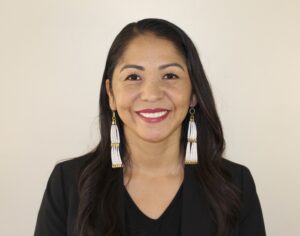Aja DeCoteau (Yakama Nation) will become the first Native American to serve on the National Park System Advisory Board, the Department of Interior announced last week.

DeCoteau is a citizen of the Confederated Tribes and Bands of the Yakama Nation. DeCoteau tribal lineage includes Cayuse, Nez Perce and Turtle Mountain Band of Chippewa Indians. She currently serves as the director of the Columbia River Inter-Tribal Fish Commission (CRITFC) where she coordinated fisheries restoration and watershed protection activities and climate change research response on behalf of the Yakama, Nez Perce, Umatilla, and Warm Springs tribes.
First authorized in 1935, the Board advises the Secretary and the Director of the National Park Service (NPS) on matters relating to the Service's work.
In addition to its advisory role, the Board also has a regulatory role in recommending new National Natural Landmarks and National Historic Landmarks and provides recommendations regarding the national historic significance of proposed National Historic Trails. In recognition of the importance of hearing from Tribal voices and perspectives when making management decisions that impact public lands and waters, Secretary Haaland added a requirement that at least one member of the Board be from a federally recognized Tribe.
“National parks are some of the most visible and important forums for visitors to explore the outdoors and learn the complicated yet vital story of America,” Haaland said in a statement. “These new National Park System Advisory Board members represent experienced practitioners in cultural and natural resources management, as well as experts in relevant academic fields including environmental law, geography, and history.”
DeCoteau has more than 20 years of experience working on natural resource management and policy issues in the Columbia River basin. She earned a bachelor’s degree in environmental studies from Dartmouth College and a master's degree in environmental management from Yale University.
Prior to serving as the Executive Director, she was CRITFC’s Watershed Department Manager, where she coordinated fisheries restoration and watershed protection activities and climate change research response on behalf of the Yakama, Naz Perce, Umatilla, and Warm Springs tribes.
The commission coordinates management policy and provides fisheries technical services for the Yajama, Warm Springs, Umatilla and Naz Perce tribes.
“Growing up in Indian Country on the lands of the Yakama Nation, I have always held a deep appreciation and sense of stewardship for our sacred waters and lands that provide our people with our first foods,” DeCoteau said in a statement. “I am honored to accept this appointment to help advise Secretary Haaland, Director Sams and the National Park System as we work to continue to provide all visitors of current and future generations the opportunity to take in and enjoy the natural beauty and wildlife of this country.”
Aja brings a breadth of experience sitting on environmental councils, including:
- Earthjustice Board of Advisors Board of Trustees
- American Rivers Board of Directors
- Columbia Land Trust Board of Directors
- Portland Energy Conservation, Inc. (PECI) Board of Directors
- Native American Youth and Family Center (NAYA) Board of Directors
- Yale Center for Environmental Justice Advisory Council
More Stories Like This
Gwich'in Tribal Governments Submit Comments Challenging Fish and Wildlife Service's Inadequate Environmental Review of Arctic Refuge Snow RoadRappahannock Tribe Challenges 9M-Gallon Water Plan
Feds release draft long-term plans for Colorado River management
Apache Leader Walks 60 Miles to Court Hearing That Will Decide Fate of Sacred Oak Flat
Rappahannock Tribe Raises Sovereignty and Environmental Concerns Over Caroline County Water Permit
Help us defend tribal sovereignty.
At Native News Online, our mission is rooted in telling the stories that strengthen sovereignty and uplift Indigenous voices — not just at year’s end, but every single day.
Because of your generosity last year, we were able to keep our reporters on the ground in tribal communities, at national gatherings and in the halls of Congress — covering the issues that matter most to Indian Country: sovereignty, culture, education, health and economic opportunity.
That support sustained us through a tough year in 2025. Now, as we look to the year ahead, we need your help right now to ensure warrior journalism remains strong — reporting that defends tribal sovereignty, amplifies Native truth, and holds power accountable.
 The stakes couldn't be higher. Your support keeps Native voices heard, Native stories told and Native sovereignty defended.
The stakes couldn't be higher. Your support keeps Native voices heard, Native stories told and Native sovereignty defended.
Stand with Warrior Journalism today.
Levi Rickert (Potawatomi), Editor & Publisher


